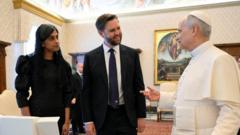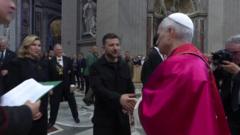As the papal conclave approaches, online betting sites are predicting Cardinal Pietro Parolin as the favorite to succeed Pope Francis. However, experts caution that the intricacies of conclave politics may challenge even seasoned gamblers.
Betting Odds Heat Up as Papal Conclave Approaches

Betting Odds Heat Up as Papal Conclave Approaches
Online prediction markets are diving into the complexities of the upcoming papal election, with Cardinal Pietro Parolin leading the bets.
As the countdown to the papal conclave begins, betting markets have entered the fray, marking a historic first for wagering on this process entwined with nearly half a millennium of tradition. With payouts hinging on predicted outcomes, the focus has turned primarily toward Cardinal Pietro Parolin of Italy, who is taking center stage as the frontrunner to become the new pope, following the reign of Pope Francis.
Betting platforms such as Polymarket and Kalshi report heavy traffic, with Parolin maintaining a strong lead. Speculation over potential health issues concerning the 70-year-old cardinal has not significantly diminished his favor among bettors, a testament to the unpredictable nature of papal elections. Behind him, Cardinal Luis Antonio Tagle from the Philippines and Cardinal Matteo Zuppi, also from Italy, are noted as potential challengers.
The process of selecting the Pope, shrouded in secrecy and conducted behind closed doors by approximately 133 cardinal electors, adds layers of complexity that could thwart even the most informed bettors. Experts point out that this environment contrasts sharply with the wealth of information guiding predictions in public elections, such as polls and debates. As noted by economist Rajiv Sethi, the conclave operates in an austere setting, devoid of leaks or external insights, making predictions precarious.
Historically, papal conclave outcomes have often defied expectations; in 2013, public sentiment skewed heavily towards Cardinal Angelo Scola, while the relatively obscure Jorge Mario Bergoglio emerged victorious as Pope Francis. Current dynamics suggest a similarly divided cardinals' cohort, many of whom are only just meeting for the first time. The potential for intricate political maneuvering and alliance-building behind the Sistine Chapel doors is paramount, creating an atmosphere ripe for unexpected shifts.
With stakes soaring, the betting market is shaking off skepticism. Preceding the conclave’s commencement, nearly $27 million has been wagered, a figure that rivals popular sporting events like the Super Bowl. The financial implications of these bets reflect the blend of tradition and modernity in one of the world's most enigmatic electoral processes, even as analysts remain cautious about delivering definitive forecasts in a setting notorious for its volatility.
Commentators, including Stefano Maria Paci, highlight the unique unpredictability of conclave voting, where swift changes can occur in the blink of an eye. As online platforms harness public interest in this rare event, the dialogue surrounding the complexities of papal elections continues to flourish amidst an environment where even the most seasoned spheres of analysis grapple with the intricacies ahead.




















